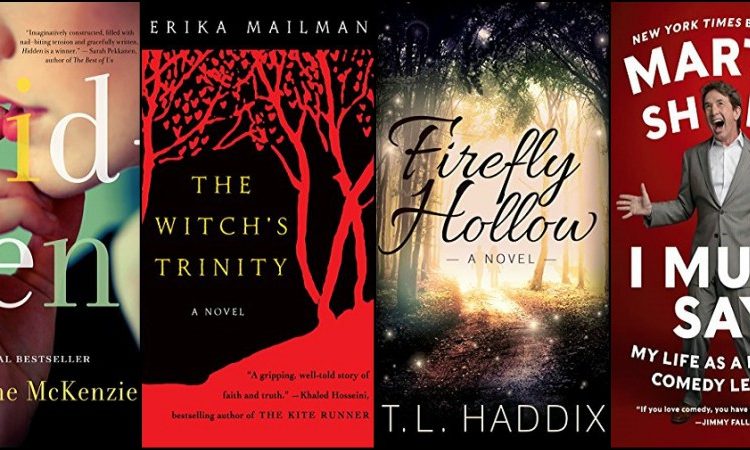Andrew Hartley is used to pissing people off.
The author of 21 published books in multiple genres, Andrew’s work spans ghost stories set in his native northern England, a YA detective series set in an imagined Victorian South Africa, UFO sci-fi, historic thrillers a la Dan Brown, novelizations of Shakespeare’s Macbeth and Hamlet, and middle-grade fantasy novels. He writes under the names A.J. Hartley, Andrew James Hartley, and Andrew Hart.
Andrew’s most recent novel Woman in Our House drew backlash because some readers didn’t like his depiction of the white characters. Some readers even tried to manipulate Amazon’s rating system to lower his rank in book sales.
Andrew, who is one of my dearest friends, and I sat down at the invitation of Sweatpants & Coffee to discuss the controversy, race and politics, and the unique relationship between a writer and reader.

Andrew Hartley and Kerra Bolton
Kerra: What is Woman in Our House about?
Andrew: A couple hires a live-in nanny. She (the nanny) is not who she says she is. Things start happening to the children. The wife starts to suspect the nanny. The people around her don’t believe her and it becomes a study of paranoia, gaslighting, and doubts about who you can trust and what you can believe.
The wife is Japanese-American and part of the background of the story is the way she’s dealt with by some of her neighbors and friends who have latent racist tendencies, which they bury in normal interaction. Some of those minor concerns with racism that show up during the course of the book become more insistent and a driving factor as the climax of the story develops at the end.
Kerra: What prompted you to write this book?
Andrew: It came in part from a conversation I had with a friend, who had an experience with a live-in nanny who turned out to be a crazy person.
As I wrote the story, I started to think more and more about the way the “crazy woman” is a frequent, convenient villain in fiction: the idea of the psychotic woman who everyone thinks is normal but is ultimately terrible. It reenacts a revival of the family-centered patriarchal myth. But I thought, “Is this actually where the danger to society is?”
During the writing of the book, (the racial unrest in) Charlottesville happened. It made me think about where the real danger to society was. It’s probably not from the apparently normal looking woman who lives in my neighborhood. It could be. But that’s not where the indiscriminate violence in this country comes from. I started to rethink the way the story could evolve.

Kerra: What surprised you about the backlash to the book?
Andrew: I suddenly started getting these 1-star reviews and attacking me, not for the first time, for putting politics into the book as if books are not political.
Some people frame it as if you’re injecting politics into something where it doesn’t belong. But politics are essential to stories, because stories are about life and life is riddled with politics, whether you are conscious of it or not. The only reason why some people are complaining about this particular story is because they don’t like the brand of politics I’m injecting into it. If the book was in accord with their politics, they wouldn’t be complaining because they would naturalize it as an ordinary, normal thing.
Kerra: You have received the same criticism of your earlier YA fantasy novels.
Andrew: Yes. Fantasy fiction has always found ways to provide analogs to the problems of the world, not to sidestep them entirely. It’s when it does sidestep them that fantasy fiction becomes crap.
Good fantasy engages with the world. That is what A Woman in Our House is trying to do as well, although it’s not fantasy. It’s a diversion to read a thriller. But I don’t think it’s less of a book if it has a rooting in reality. Quite the contrary.
Kerra: What do you think is the relationship between a reader and a writer?
 Andrew: You have to write your own truth or a version of it. That’s a deeply personal experience. But there’s a point at which, when the book is done, it ceases to be yours. Other people feel ownership of that material.
Andrew: You have to write your own truth or a version of it. That’s a deeply personal experience. But there’s a point at which, when the book is done, it ceases to be yours. Other people feel ownership of that material.
The reader is a co-creator in the production of meaning. It’s their imagination interacting with my words. I can’t control the way people are going to react to what I write. That’s ok, but it puts pressure on the writer to make sure they say what they really want to stand by.
Kerra: Who is your ideal reader, besides the one who buys your books?
Andrew: My ideal reader is somebody who is smart and open-minded, who will take the book at face value, and be led by it. A reader who is prepared to go on a journey with you and take it seriously. If they get to the end of the book and they disagree with you or they dislike certain things, that’s fine, especially if they have specific reasons for their position. I’m not looking for people who are going to love whatever I write. That’s not the point.
Novels work sentence by sentence. It’s not just about plot. My ideal reader is somebody who lives between literary fiction and genre fiction. They want a little more than plot and action from their genre fiction and a little more story from their literary fiction.
Kerra: Has the rise of streaming services for television and fan culture changed the way we read, as well as the relationship between the reader and the writer?
Andrew: The technological change and the massive availability of print…fan fiction, self-pub, small press has created a massive range of instantly available material. As with a lot of things in late-stage capitalism, what that means is the customer is always right. Some readers choose within a niche that is particularly dovetailed to their interests, experiences, and sensibility. Anything that doesn’t fulfill their precise expectations can be discarded as inadequate, which I think is unfortunate and limiting for both the reader and the writer.
On other hand, one of the upsides of this wealth of material is that there really is something for everyone, in ways there didn’t used to be. There are, for instance, lots of books from authors of color featuring characters of color. That’s a good thing.
Kerra: Can reading be a hopeful act?
Andrew: A good story is grounded in reality. Reality is complex and nuanced and not everything in it is great.
The supreme fantasy is that ultimately most of the problems in the story can be solved. You can take people on a journey, explore difficult stuff, and fix it. That in itself is hopeful. Maybe if we all keep trying, we can make the world better.







Can Reading Be Hopeful in an Age of Cynicism? – Kerra Bolton
[…] (Sweatpants & Coffee) — Andrew Hartley is used to pissing people off. […]